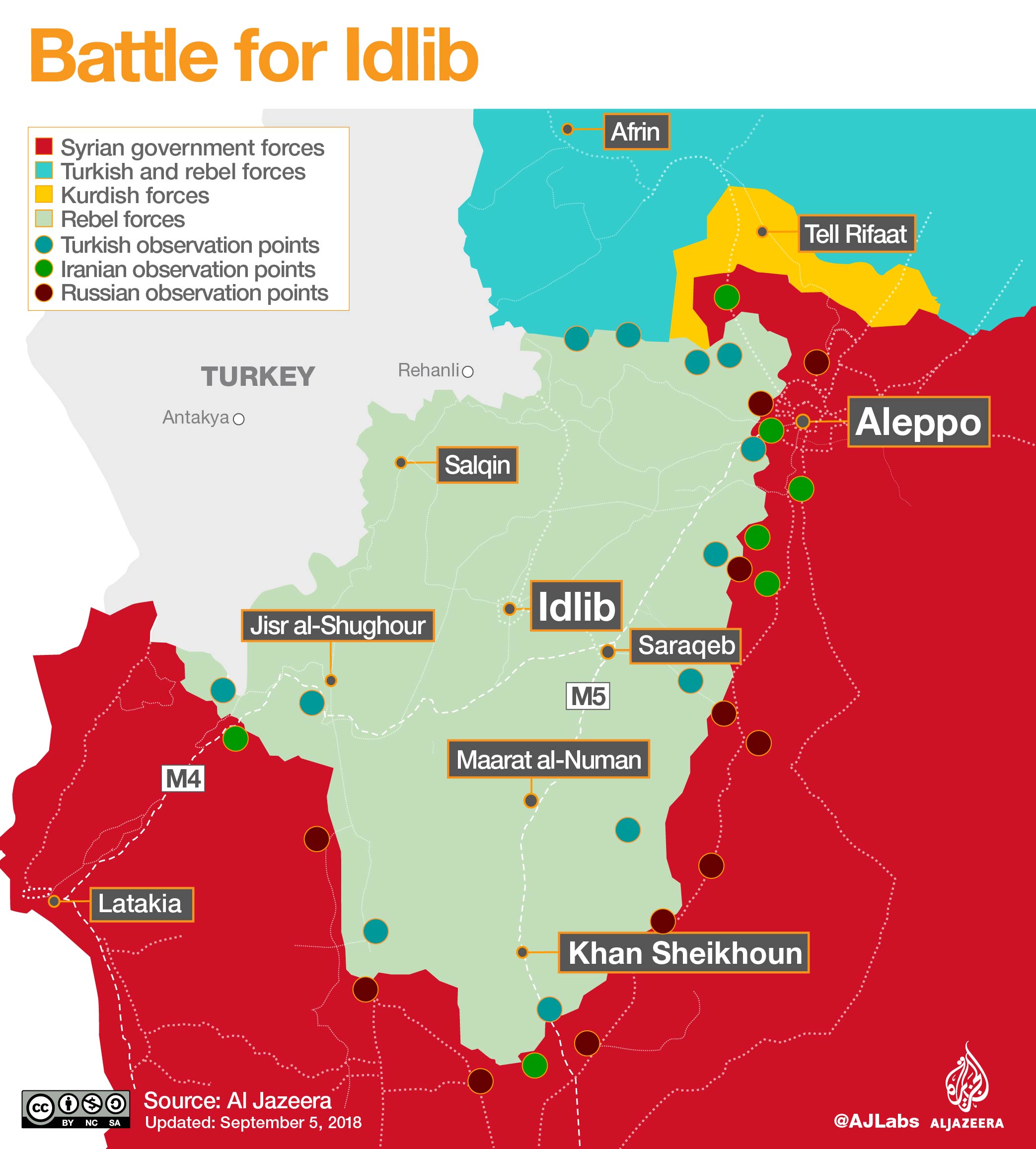Syria: Rebel-held areas bombed as Turkey reinforces outposts
Antakya, Turkey – Russian-backed Syrian government forces have pounded rebel-held areas in northwest Syria, killing at least five people in a second day of heavy bombardment, according to rescuers.
The intensified strikes on Sunday, including air attacks, shelling and helicopter-dropped barrel bombs, targeted villages in southern Idlib and northern Hama provinces.
The escalation comes amid growing fears over a seemingly imminent all-out offensive against the densely populated Idlib province, the last rebel bastion in Syria.
A baby and a young child were killed in the village of Habeit in southern Idlib in a barrel bomb attack, according to the White Helmets, a civil defence group operating in rebel-held areas.
Three others, including a rebel officer, were killed in air raids and shelling that struck the northern Hama province.
Abd al-Karim al-Rahmoun, a member of the White Helmets in northern Hama, said that about half of the local population had left the sparsely populated region to escape the bombardment.
Activists told Al Jazeera that while hundreds of people have been fleeing the attacks in northern Hama and southern Idlib provinces, there has not been a significant wave of civilians moving towards the north.
In some cases, the activists said, people would leave their villages early in the morning and return after sunset once the bombardment stopped.
According to the UK-based Syrian Observatory for Human Rights (SOHR), over the past 72 hours, forces loyal to Syrian President Bashar al-Assad and his Russian ally have hit rebel-held areas 1,060 times with air attacks, shelling and barrel bombs.
In response, al-Jabha al-Wataniya lil-Tahrir (NLF), a major armed opposition group, on Sunday shelled government forces’ positions in northern Hama, SOHR reported.
Meanwhile, another convoy of Turkish military vehicles crossed into Idlib province on Sunday.
Over the past 10 days, a number of similar convoys carrying weapons and armoured cars have entered northern Syria to reinforce 12 observation points manned by Turkish soldiers.
These outposts, which are located in rebel-held areas in western Aleppo, northern Hama and Idlib provinces, were established under the de-escalation agreements reached by Turkey, Iran and Russia.
“[These reinforcements are] a sign that Turkey treats the issue of Idlib very seriously and it is not going to easily turn a blind eye on any Russian, regime or Iranian military design for it,” said Galip Dalay, director of research at the Istanbul-based Sharq Forum.
Dalay said Turkey would not withdraw its troops from the observation posts any time soon, unless it reached an agreement with Russia, Iran and the Syrian government.
“At this stage, I don’t see a deal that exists,” he said. “During this period, targeted attacks will continue … but will not produce any big waves of refugees.”
 |
Already hosting more than three million Syrian refugees, Turkey is keen to avoid a full-fledged government offensive. Its call for a ceasefire, however, was rejected on Friday by Russia at a summit in Iran’s capital, Tehran.
Speaking to reporters earlier on Sunday, Suleyman Soyli, Turkey’s interior minister, warned of the possibility of mass displacement in the event of a large-scale military offensive on Idlib.
“We care about humanity and we won’t give up. We will not be responsible for a migration wave in case of possible attacks [on Idlib],” Soyli said.
The northwestern province bordering Turkey is home to an estimated three million people, half of whom are internally displaced.
Soyli added that 255,300 Syrians have returned to their homes over the past two years, including 160,000 who went to the “Euphrates Shield region” in northern Aleppo province, which rebel groups and the Turkish army took over from the Islamic State of Iraq and the Levant (ISIL, also known as ISIS) in 2016.




